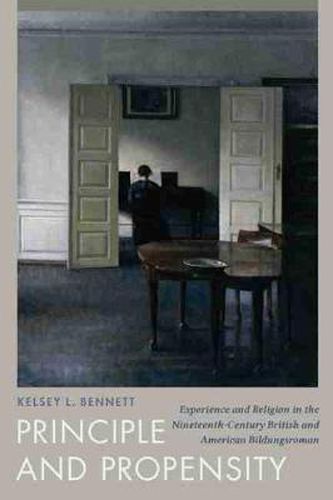Readings Newsletter
Become a Readings Member to make your shopping experience even easier.
Sign in or sign up for free!
You’re not far away from qualifying for FREE standard shipping within Australia
You’ve qualified for FREE standard shipping within Australia
The cart is loading…






Scholars have traditionally relied upon the assumption that the nineteenth-century bildungsroman in the Goethean tradition is an intrinsically secular genre exclusive to Europe, incompatible with the literature of a democratically based culture. By combining intellectual history with genre criticism, Principle and Propensity provides a critical reassessment of the bildungsroman, beginning with its largely overlooked theological premises: bildung as formation of the self in the image of God. Kelsey L. Bennett examines the dynamic differences, tensions, and possibilities that arise as interest in spiritual growth, or self-formation, collides with the democratic and quasi-democratic culture in the nineteenth-century British and American bildungsroman.
Beginning with the idea that interest in an individual’s moral and psychological growth, or bildung, originated as a religious exercise in the context of Protestant theological traditions, Bennett shows how these traditions found ways into the bildungsroman, the literary genre most closely concerned with the relationship between individual experience and self-formation.
Part 1 of Principle and Propensity examines the attributes of parallel national traditions of spiritual self-formation as they convened under the auspices of the international revival movements: the Evangelical Revival, the Great Awakening, and the renewal of Pietism in Germany, led respectively by John Wesley, Jonathan Edwards, and Count Nikolaus Ludwig Zinzendorf. Further it reveals the ways in which spiritual self-formation and the international revival movements coalesce in the bildungsroman prototype, Johann Wolfgang von Goethe’s Wilhelm Meisters Lehrjahre (Wilhelm Meister’s Apprenticeship). Part 2 in turn explores the ways these traditions manifest themselves in the nineteenth-century bildungsroman in England and the United States through Jane Eyre, David Copperfield, Pierre, and Portrait of a Lady.
Though Wilhelm Meisters Lehrjahre was a library staple for most serious writers in nineteenth-century England and in the United States, Bennett shows how writers such as Charlotte Bronte, Charles Dickens, Herman Melville, and Henry James also drew on their own religious traditions of self-formation, adding richness and distinction to the received genre.
$9.00 standard shipping within Australia
FREE standard shipping within Australia for orders over $100.00
Express & International shipping calculated at checkout
Scholars have traditionally relied upon the assumption that the nineteenth-century bildungsroman in the Goethean tradition is an intrinsically secular genre exclusive to Europe, incompatible with the literature of a democratically based culture. By combining intellectual history with genre criticism, Principle and Propensity provides a critical reassessment of the bildungsroman, beginning with its largely overlooked theological premises: bildung as formation of the self in the image of God. Kelsey L. Bennett examines the dynamic differences, tensions, and possibilities that arise as interest in spiritual growth, or self-formation, collides with the democratic and quasi-democratic culture in the nineteenth-century British and American bildungsroman.
Beginning with the idea that interest in an individual’s moral and psychological growth, or bildung, originated as a religious exercise in the context of Protestant theological traditions, Bennett shows how these traditions found ways into the bildungsroman, the literary genre most closely concerned with the relationship between individual experience and self-formation.
Part 1 of Principle and Propensity examines the attributes of parallel national traditions of spiritual self-formation as they convened under the auspices of the international revival movements: the Evangelical Revival, the Great Awakening, and the renewal of Pietism in Germany, led respectively by John Wesley, Jonathan Edwards, and Count Nikolaus Ludwig Zinzendorf. Further it reveals the ways in which spiritual self-formation and the international revival movements coalesce in the bildungsroman prototype, Johann Wolfgang von Goethe’s Wilhelm Meisters Lehrjahre (Wilhelm Meister’s Apprenticeship). Part 2 in turn explores the ways these traditions manifest themselves in the nineteenth-century bildungsroman in England and the United States through Jane Eyre, David Copperfield, Pierre, and Portrait of a Lady.
Though Wilhelm Meisters Lehrjahre was a library staple for most serious writers in nineteenth-century England and in the United States, Bennett shows how writers such as Charlotte Bronte, Charles Dickens, Herman Melville, and Henry James also drew on their own religious traditions of self-formation, adding richness and distinction to the received genre.